



It was only a matter of time. On February 6, 2023 Google shared a blog post by Sundar Pichai. Titled "An important next step on our AI journey", it showcased Google’s response to ChatGPT, the chatbot that has been trending almost ever since it hit the scene a couple of months ago. This blog post was backed up by a tweet with a GIF that shows Bard, Google’s AI chatbot answering the question “What new discoveries from the James Webb Space Telescope can I tell my nine-year-old about?” Twitter users were quick to point out that the chatbot was delivering inaccurate information. Not the start that Google would have envisioned for Bard.
Rocky startWhile Bard said “JWST took the very first pictures of a planet outside of our solar system”. ZDNET reporter Stephanie Condon pointed out that the first photo of an exoplanet was captured in 2004 by the European Southern Observatory’s VLT (Very Large Telescope). Google’s tweet hasn’t been pulled down and has been viewed by millions of users. Google was quick to put out a statement acknowledging it’s error to ZDNET: “This highlights the importance of a rigorous testing process, something that we're kicking off this week with our Trusted Tester program," a Google spokesperson said in a statement. "We'll combine external feedback with our own internal testing to make sure Bard's responses meet a high bar for quality, safety, and grounded-ness in real-world information."
Google is betting big on BardThe blog post by Sundar Pichai demonstrates Google’s big push for Bard and the future of conversational AI. The note highlighted how the scale of the largest AI computations is doubling every six months, far outpacing Moore’s Law. The post also revealed that Google’s Transformer research project and their field-defining paper in 2017, as well as important advances in their diffusion models, provide the the basis of many of the generative AI applications that we’re starting to see today. Bard is powered by LaMDA (Google’s Language Model for Dialogue Applications). According to Google, Bard seeks to combine the breadth of the world’s knowledge with the power, intelligence and creativity of their large language models. It draws on information from the Web to provide fresh, high-quality responses.
What is Generative AI?Chatbots like ChatGPT and Bard are based on Generative Artificial Intelligence. According to a white paper by McKinsey, any time an AI technology is generating something on its own, it can be referred to as “generative AI.” This umbrella term includes learning algorithms that make predictions as well as those that can use prompts to autonomously write articles and paint pictures. Google’s strength stems from its domination of the search engine space. Google believes that AI can be helpful in critical moments, synthesising insights for questions where there’s no one right answer. Google is all set to add AI-powered features in Search that distil complex information and multiple perspectives into easy-to-digest formats. Google has confirmed that these new AI features will begin rolling out on Google Search soon.
Has Generative Artificial Intelligence truly arrived?Not according to John Hennessy, who has been chairman of Alphabet, Google’s parent company since 2018. He was speaking at a summit in Mountain View, California in February 2023 soon after Bard’s Twitter debut sparked a lot of discussion. He believes that Generative AI is still a year or two away from being a truly useful tool to the public at large. “I think Google was hesitant to productize this because it didn’t think it was really ready for a product yet, but, I think, as a demonstration vehicle, it’s a great piece of technology,” Google has confirmed that it will roll out Bard to the general public in the next few weeks. This chatbot is still restricted to testing by a select set of users for now.
Generative AI driving chatbot race for supremacyWe are already seeing generative AI create marketing content, generate code, and in conversational applications such as chatbots. Microsoft has unveiled a new version of the Bing search engine that is powered by a next-gen Open AI large language model that it says is more powerful than ChatGPT. According to Satya Nadella, CEO, Microsoft, AI is all set to reshape every software category starting with Search. Microsoft has also launched an improved version of its Edge browser with AI-based features. Meanwhile ChatGPT has rolled out its new subscription plan, ChatGPT Plus, at $20/month in the US with benefits like faster response times and access to ChatGPT even during peak times. Bard will soon be available for all users. Can it take the fight to ChatGPT with its search-engine prowess? That’s not a prediction any generative AI tool might be able to make; at least not yet.

Discover the latest Business News, Sensex, and Nifty updates. Obtain Personal Finance insights, tax queries, and expert opinions on Moneycontrol or download the Moneycontrol App to stay updated!
Find the best of Al News in one place, specially curated for you every weekend.
Stay on top of the latest tech trends and biggest startup news.